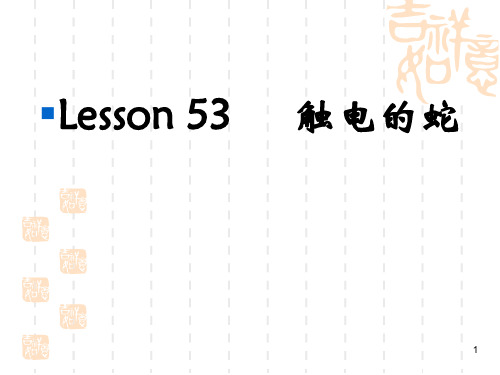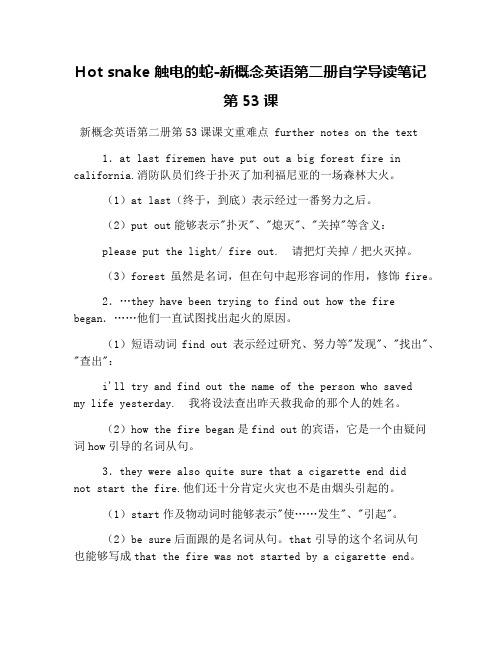新概念英语第二册:第53课课文详解及语法解析
- 格式:docx
- 大小:38.50 KB
- 文档页数:4


Lesson 53 Hot snake【New words and expressions】生词和短语〔13〕hot adj. 带电的,充电的 fireman n. 消防队员 cause v. 引起; n. 原因examine v. 检查 accidentally adv. 意外地,偶然地remains n. 尸体,残骸 wire n. 电线 volt n. 伏特〔电压单位〕power line电力线 solve v. 解决 mystery n. 谜〔无法承受地, 解释不了的〕snatch v. 抓住 spark n. 电火花★hot adj. 带电的, 充电的 hotter-hottesthot adj. 热的(cold);hot water; hot weather,炎热的天气 a hot day ; Strike while the iron is hot.趁热打铁Hot炎热的 warm温暖的 cool凉爽的 chilly 寒冷的 cold严寒的带电的, 充电的辣的。
The papper is very hot.强烈的 have a hot temper; a hot debate激烈的辩论 get hot on rock music热衷于摇滚最新的 hot news on sth. Magazine hot from the press刚出版的杂志Be hot on sb.迷恋某人,爱慕某人 be in hot water 惹上麻烦=get/run into troublea hot potato 棘手的问题 get hot under the collar勃然大怒hot-hot-hot麻辣烫;hot-wings辣鸡翅;hot dog热狗hot-tempered火暴(脾气)的〔temper n. 脾气〕 hot line热线;hot topic热门话题hot cake热蛋糕 It sells like a hot cake/cakes.表示一个东西的畅销, 热销★fireman n. 消防队员复合名词:fireplace壁炉;firework烟火;fire-fighter消防队员〔尤其护林的);firehouse消防站hydrant n. 消防栓, 消防龙头fire extinguisher灭火器〔extinguisher n. 熄灭者, 灭火器〕extinguish=put out灭火★cause v.& n. 引起;原因① v. 引起cause sth.引起麻烦 Carelessness causes accidents.粗心导致事故 Pride causes failure.骄傲使人失败cause sb. to do sth. 引起某人做某事, 导致某人做某事Illness caused him to lose his temper. (lose one’s temper 发火)A cause B=A lead to B=B result from A=A result in B=A bring about B② n. 原因,强调事情发生的直接原因(一个) find out the causebecause因为 reason理由,其他各种的理由(很多个)★examine v. 检查仔细观察,调查examine the soil the firefighter examined every inch of the forest.V.诊查。

Lesson 53 Hot snake【New words and expressions】(13)★hot adj. 带电的,充电的hot adj。
热的;新鲜的;棘手的;带电的, 充电的hot—hot—hot 麻辣烫;hot-wings 辣鸡翅;hot dog 热狗hot—tempered 火暴(脾气)的(temper n。
脾气)hot line 热线;hot topic 热门话题hot cake 热蛋糕It sells like a hot cake/cakes。
表示一个东西的畅销, 热销best seller 畅销的东西hot potato 棘手的问题hot news 最热点的新闻★fireman n. 消防队员hydrant n。
消防栓, 消防龙头fire extinguisher 灭火器(extinguisher n. 熄灭者,灭火器)extinguish=put out 灭火★cause v。
& n. 引起;原因① v. 引起cause sth。
引起麻烦Carelessness causes accidents。
粗心导致事故Pride causes failure。
骄傲使人失败cause sb. to do sth. 引起某人做某事, 导致某人做某事Illness caused him to lose his temper。
(lose one’s temper 发火)② n。
原因,强调事情发生的直接原因(一个)because 因为reason 理由,其他各种的理由(很多个)★examine v。
检查examine the soilcheck v。
核实,核对★accidentally adv. 意外地, 偶然地 (但更趋向于“偶然”的意思) accident->accidental-〉accidentallyaccident n. 事故unexpectedly adv. 出乎意料地(更趋向于“意外”的意思)★remains n。

新概念英语二册超详教案讲义笔记Lesson53 Hot snake 触电的蛇Lesson 53 Hot snake 触电的蛇【New words and expressions】(13)hot adj. 带电的,充电的fireman n. 消防队员cause v. 引起;n. 原因examine v. 检查accidentally adv. 意外地,偶然地remains n. 尸体,残骸wire n. 电线volt n. 伏特(电压单位)power line 电力线solve v. 解决mystery n. 谜(无法接受地, 解释不了的)snatch v. 抓住spark n. 电火花★hot adj. 带电的, 充电的hot adj.hot – hotter – hottest热的,炎热的(反义词cold)eg. hot water / hot weather / a hot dayhot 炎热的—— warm 温暖的—— cool 凉爽的—— chilly 寒冷的—— cold 寒冷的,严寒的(调味品等)辣的eg. Pepper and mustard are hot. 胡椒和芥末都很辣。
强烈的,激烈的,热烈的eg. have a hot temper 脾气暴躁a hot debate 激烈的辩论get hot on rock music 热衷于摇滚音乐(新闻等)最新的,刚发生的,刚到达的eg. hot potato 棘手的问题hot news 最热点的新闻hot news on the election results 选举结果的最新消息a magazine hot from the press 刚出版的杂志a young man hot from school 刚出校门的年轻人be hot on sb. 迷恋某人,爱慕某人be in hot water 惹上麻烦= get into trouble = run into trouble★fireman n. 消防队员fire-fighter 消防队员fireplace 壁炉firework 烟火fire-water 烈酒firehouse 消防队,消防站= fire stationfireproof adj. 耐火的fire-raising n. 放火,纵火fire extinguisher 灭火器(extinguisher n. 熄灭者, 灭火器)(extinguish=put out 灭火)★cause v.& n. 引起;原因(1) v. 引起,导致eg. A cigarette caused the forest fire. 一支香烟导致这场森林大火。

逐句精讲新概念英语第二册:第53课触电的蛇Lesson53 Hot snake新概念英语2课文内容:At last firemen have put out a big forest fire in California. Since then, they have been trying to find out how the fire began. Forest fire are often caused by broken glass or by cigarette ends which people carelessly throw away.Yesterday the firemen examined the ground carefully, but were not able to find any broken glass. They were also quite sure that a cigarette end did not start the fire. This morning, however, a fireman accidentally discovered the cause. He noticed the remains of a snake which was wound round the electric wires of a 16,000-volt power line. In this way, he was able to solve the mystery. The explanation was simple but very unusual. A bird had snatched up the snake from the ground and then dropped it on to the wires. The snake then wound itself round the wires. When it did so, it sent sparks down to the ground and these immediately started a fire..本文语法:现在完成进行时一句话总结:现在完成进行时表示过去某时开始发生,一直延续到现在并且可能继续发生下去的动作。

Hot snake 触电的蛇-新概念英语第二册自学导读笔记第53课新概念英语第二册第53课课文重难点 further notes on the text1.at last firemen have put out a big forest fire in california.消防队员们终于扑灭了加利福尼亚的一场森林大火。
(1)at last(终于,到底)表示经过一番努力之后。
(2)put out能够表示"扑灭"、"熄灭"、"关掉"等含义:please put the light/ fire out. 请把灯关掉/把火灭掉。
(3)forest虽然是名词,但在句中起形容词的作用,修饰fire。
2.…they have been trying to find out how the fire began.……他们一直试图找出起火的原因。
(1)短语动词find out表示经过研究、努力等"发现"、"找出"、"查出":i'll try and find out the name of the person who savedmy life yesterday. 我将设法查出昨天救我命的那个人的姓名。
(2)how the fire began是find out的宾语,它是一个由疑问词how引导的名词从句。
3.they were also quite sure that a cigarette end didnot start the fire.他们还十分肯定火灾也不是由烟头引起的。
(1)start作及物动词时能够表示"使……发生"、"引起"。
(2)be sure后面跟的是名词从句。
that引导的这个名词从句也能够写成that the fire was not started by a cigarette end。
【导语】新概念系列教材的经典早已不⾔⽽喻。
其⽂章的短⼩精悍,语句的幽默诙谐,语法的全⾯⽽系统,历来被公认为是适合⼤多数中学⽣课外学习的资料之⼀。
为您整理了以下内容,仅供参考。
希望可以帮助到您!如果您想要了解更多相关内容,欢迎关注! 词汇学习 Word study cause与reason (1)cause作名词时最重要的含义是"原因"、"起因": A fireman accidentally discovered the cause of the fire. ⼀个消防队员偶然发现了起⽕的原因。
Do you know the cause of the war? 你知道这场战争的起因吗?(cause通常与of连⽤) cause作动词时可以表⽰"使……产⽣/发⽣"、"引起": Forest fires are often caused by broken glass or cigarette ends. 森林⽕灾时常由碎玻璃或⾹烟头引起。
What caused the accident? 事故是如何造成的? (2)reason作名词时最重要的含义是"理由"、"原因": Give me your reasons for going there. 请告诉我你去那⾥的理由。
What was the reason for the delay? 延迟的原因是什么? 作"原因"讲时,reason与cause可以互相交换使⽤,但reason与介词for连⽤,⽽cause则与介词of连⽤: What was the cause of the delay? (译⽂同上) reason后⾯通常跟why引导的从句: That was the reason why the meeting was put off. 这就是会议推迟的原因。
Lesson 53 Hot snake 触电的蛇【New words and expressions】(13)hot adj. 带电的,充电的fireman n. 消防队员cause v. 引起;n. 原因examine v. 检查accidentally adv. 意外地,偶然地remains n. 尸体,残骸wire n. 电线volt n. 伏特(电压单位)power line 电力线solve v. 解决mystery n. 谜(无法接受地, 解释不了的)snatch v. 抓住spark n. 电火花★ hot adj. 带电的,充电的同義詞fiery, flushed, burning, steaming反義詞cold, cool, frigid, icy 變化形形變hotter hottesthot-hotted- hotted -hotting(1)熱的、炎熱的(反義詞cold)hot water ;hot weather ;a hot dayeg:Strike while the iron is hot . 趁熱打鐵.(諺)勿錯失良機。
hot 炎熱的→ warm 溫暖的→ cool 涼爽的→ chilly寒冷的→cold 寒冷的、嚴寒的(2)(調味品等)辣的eg:Pepper and mustard are hot . 胡椒和芥末都是辣的.(3)強烈的、激烈的、熱烈的have a hot temper 怒りっぽいa hot debate 激烈的討論get hot on rock music 熱衷搖滾樂(4)(新聞等)最新的,剛發生的、剛到達的hot news on the election results 選舉的結果的最新消息a magazine hot from the press 剛出版的雜誌a young man hot from school 剛從學校踏出社會的年輕人be hot on sb 迷戀某人、愛慕某人be in hot water 惹上麻煩、陷入困境(受辱)get / run into trouble 遇到麻煩a hot potato 棘手的問題、燙手山芋get hot under the collar 怒氣沖衝的;局促不安★ fireman n. 消防队员同義詞fire fighter, fire extinguisher, fire tender變化形名複firemenfireplace [ˈfaiəpleis] n.壁爐firework [ˈfaiəwə:k] n.爆竹,(常pl.)煙火fire-water消防用水;fire-fighter救火員firehouse消防隊=fire station消防站fireproof ['faiəpru:f] adj. 耐火的, 防火的vt. 使耐火, 使防火fire-raising n. 放火、縱火★ cause v. 引起;n. 原因; 起因[C][U][(+of)]同義詞motive, reason, occasion, basis反義詞result, consequence, effect, outcome變化形名複causes 變化形動變caused caused causing(1)v. 引起、導致eg:A cigarette caused the forest fire . 香煙引起的森林大火。
Lesson 53 Hot snake单词讲解课文语法讲解:一般过去时/现在完成时/现在完成进行时知识拓展:易混淆词一.单词讲解1. causev. 引起Carelessness causes accidents.n. 起因the cause of the fire2. examine v. 检查examiner n. 主考官examination n. 检查,考试(exam)3. accidentally adv. 意外地,偶然地do sth. accidentally= do sth. by accident= do sth. by chance 偶然地做某事accidentally adv. 意外地,偶然地accidental adj. 意外的accident n. 事故,意外5. remains n. 尸体,残骸(本义:剩余留下来的东西)the remains of a snake 蛇的尸体remain v. 保持,保留remain silent 保持安静6. wire n. 电线wireless adj. 无线的wireless network / mouse / keyboard无线网络/无线鼠标/无线键盘7. solve v. 解决solve the mystery 解决这个谜题solve the problem 解决问题solve the problem of … 解决...的问题solve the problem of air pollution / earthquake二.课文语法讲解:一般过去时/现在完成时/现在完成进行时1. 一般过去时did (完全发生在过去,有过去的时间或过去的动作)现在完成时have/has done (完全发生在过去,站在现在的角度;或者从过去发生到现在)现在完成进行时have/has been doing (和现在完成时的用法一样,若强调过程用现在完成进行时;若强调结果用现在完成时)练习:1.At last firemen have put out a big forest fire in California. 现在完成时(强调结果)Since then, they have been trying to find out how the fire began. 现在完成进行时(强调过程)2.Forest fires are often caused by broken glass or by cigarette ends which people carelessly throw away.1)forest fires 森林大火cigarette ends 烟头都是名词修饰名词,变复数通常后变前不变。
新概念英语第二册:第53课课文详解及语法解析课文详注 Further notes on the text
1.At last firemen have put out a big forest fire in California.消防队员们终于扑灭了加利福尼亚的一场森林大火。
(1)at last(终于,到底)表示经过一番努力之后。
(2)put out能够表示“扑灭”、“熄灭”、“关掉”等含义:
Please put the light/ fire out.
请把灯关掉/把火灭掉。
(3)forest虽然是名词,但在句中起形容词的作用,修饰fire。
2.…they have been trying to find out how the fire began.……他们一直试图找出起火的原因。
(1)短语动词find out表示经过研究、努力等“发现”、“找出”、“查出”:
I'll try and find out the name of the person who saved my life yesterday.
我将设法查出昨天救我命的那个人的姓名。
(2)how the fire began是find out的宾语,它是一个由疑问词how引导的名词从句。
3.They were also quite sure that a cigarette end did not start the fire.他们还十分肯定火灾也不是由烟头引起的。
(1)start作及物动词时能够表示“使……发生”、“引起”。
(2)be sure后面跟的是名词从句。
that引导的这个名词从句也能够写成that the fire was not started by a cigarette end。
但
这里强调的是引起火灾的原因(不是碎玻璃或烟头),所以用烟头作主语。
4.…a fireman accidentally discovered the cause.……一个
消防队员偶然发现了起火的原因。
discover本身含有偶然发现(某个已经存有的东西)的含义:
I don't know who discovered America.
我不知道谁发现美洲的。
在discover前面加上accidentally更增强了“偶然”、“意外”的含义。
5.He noticed the remains of a snake which was wound
round the electric wires of a 16,000-volt power line.他发现了
缠绕在16,000伏高压线上的一条死蛇。
(1)the remains表示“尸体”、“残骸”,必须用复数形式:
The villagers were surprised to see the remains of an aeroplane near the
lake.
村民们惊讶地发现湖边有一架飞机的残骸。
(2)wound为wind的过去分词。
wind在这里不表示“蜿蜒”,而
表示“卷在……上”、“缠绕”,常与around/round连用:
Did you wind this piece of wire round the tree?
是你把这根铁丝缠在树上的吗?
(3)wire指具体的电线、铁丝等,line在这里指“线路”,含义
比wire广。
6.When it did so…当它这样做时……
so常用于一些动词之后,代指前面提过的某个动作/某件事,以免重复:
Has Susan got into university?
苏珊上大学了吗?
I believe/think so.
我想是的。
语法 Grammar in use
一般过去时、现在完成时与现在完成实行时(cf.第29课与第52课语法)
一般过去时通常与一个表示确切的时间的状语连用,现在完成时则有时与表示一段时间的状语连用,有时不需要时间状语,而现在完成实行时则有时与表示一段时间的状语连用,有时与all+表示时间的名词连用。
现在完成时与一般过去时中既能够用状态动词(表示存有、拥有、感情、思想、需求等的动词)也能够用行为动词,现在完成实行时则通常与行为动词连用:
When did you visit Old Delhi?
你什么时候去旧德里游览的?
I visited it two years ago.
两年前我去过。
(一般过去时,有确切的时间状语)
Have you ever visited Old Delhi?
你去旧德里游览过吗?
Yes,I've visited it twice.
是我,我去过两次。
(没有确切的时间状语)
Yes,I visited it two years ago.
是的,两年前我去过。
Yes,I once visited it for two weeks.
是的,有一次我在那里观光了两星期。
(once与一般过去时连用)。